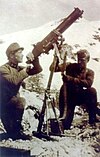Model 17 grenade
Appearance
This article includes a list of references, related reading, or external links, but its sources remain unclear because it lacks inline citations. (September 2014) |
| Model 17 Eierhandgranate (M17 egg hand grenade) | |
|---|---|
 The left example is fitted with a transportation plug and the right one with an ignition fuse. | |
| Type | Hand grenade |
| Place of origin | German Empire |
| Service history | |
| In service | 1916–? |
| Used by | |
| Wars | World War I |
| Production history | |
| Produced | 1916–? |
| Specifications | |
| Mass | 318 g (0.701 lb) |
| Length | 6 cm (2.4 in) |
| Diameter | 4.6 cm (1.8 in) |
| Filling | Gun powder, aluminium and barium nitrate mixture |
| Filling weight | 32g |
Detonation mechanism | Friction, 5 seconds |
The Model 17 Eierhandgranate (German for "egg hand grenade") is a small defensive and offensive hand grenade which was used by Germany during World War I. The average soldier could throw it 40 meters or further. It was more portable than the heavier Kugelhandgranate and less awkward to handle than the stick grenade. The body of the grenade was initially smooth and thus difficult to hold so the design was modified with the addition of a raised band for better grip.
A similar grenade called the Model 39 grenade was later introduced by Germany and used in World War II.
References
[edit]- Imperial German Eierhandgranate 1917, WWI
- Passion & Compassion 1914-1918 : WW1 militaria and technical documentation - german grenades

